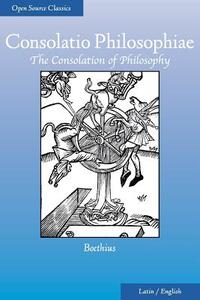Take a photo of a barcode or cover
informative
reflective
slow-paced
relaxing
slow-paced
‘To the objection that evil men do have power, I would say that this power of theirs comes from weakness rather than strength. For they would not have the power to do the evil they can if they could have retained the power of doing good. This power only makes it more clear that they can do nothing, for if, as we concluded a short time ago, evil is nothing, it is clear that since they can only do evil, the wicked can do nothing.’
The argument (which requires a heaven, at least in the simplistic way that Boethius puts it) that only “good” can accrue true power while the “bad” is always less powerful is a justification for christian imperialism and, in the last few centuries, white supremacy. For after all, if christian empires hold so much power, then by this logic they are unquestionably good. Boethius is awaiting death as he writes this, and it seems like in the absence of clemency he decided to rail against not the perceived injustice of his sentence but his own grief reaction to his impending execution. This is the stranglehold of christianity: have the individual renounce their own experience of the world in favor of the crushing status quo. This isn’t to say that an individual worldview is always complete, but rather that individualization offers a better chance of critically interrogating reality and developing personal meaning than when the christian god is offered as the only and final solution to all philosophical arithmetic.
It should go without saying, but because Boethius takes for granted that “good” and “evil” are universal concepts he is laying the groundwork for (or at least continuing the tradition of) imperial exploitation of indigenous populations around the world. He goes so far as to argue that the wicked are not “real” in the same way that other humans are. This reminds me of Lewis’ equally flaccid argument (in Mere Christianity) that good is the true nature of humanity because while good can be done and enjoyed for its own sake, evil is only ever done in pursuit of some good outcome (pleasure, power, etc.). This smacks of Maslow. As though humans aren’t experiential beings capable of enjoying or hating anything. We have a sublime (and inherently philosophical) desire for encounters and experiences that would challenge even the capacity of a master reductionist like Lewis or Boethius to categorize them as good or bad. Free all the deviants. Give all the land back.
This little tract is a great example of the blind alleys that you’re led into when you refuse from the start to question normative morality. Even if you give Boethius the benefit of the doubt and assume that his terminology is descriptive, the logic underlying his points is extremely poor throughout. There is no “problem of evil” that makes justifying god’s omnipotence difficult; there is no god. Start from there and work outwards/inwards. I expect that Boethius died unconsoled.
challenging
hopeful
inspiring
reflective
medium-paced
Creating a fanfiction like this might be reprehensible under different circumstances, but I think we can forgive Boethius, the man who was imprisoned for a year or so before he was put to death, for trying to jab away at the despair he must have felt during those days. The beggining of the work is touching, as the hopeless narrator encounters his savior, Lady Philosophy, he tells her how and why he got there and how all the evils of the world came down upon him. It all feels very human and quite touching to be honest. I say the work merits a read on this count and for its combination of poetry and philosophy, this is the last work of the ancients after all. Then we get into the arguments for the rest of the book. I can't say I'm convinced, the conceptions adopted by the ancients are too alien to our contemporary nature. Or rather, they become so when overly analysed and used in formal arguments. At times this felt painfully scholastic, I'm not sure if there is any actual relation, but it felt just as annoying. All in all, I would not be in a hurry to recommend this book to anyone. I would say that for someone wanting to read philosophy there are far more important works to tackle than this. Eh, still kinda glad I read it.
challenging
inspiring
reflective
slow-paced
not much to say- one of the better philosophy books i’ve read, but still boring and hard to understand sometimes like most books like this. 4/5 stars
A re-read for me, but just as enjoyable. I will always be amazed at how Boethius wrote this in the conditions he was in. Many philosophically relevant problems are discussed, including free will, evil, fortune, and divine providence. Incredible how he crated some beautiful songs as well. Many quotable lines, and one of my favourite philosophy books to read for pure enjoyment. When I was first starting out, book II was very startling when he point out the flaws in searching for happiness through various flawed means, whether it be money, fame etc. Highly recommend
This is one of those books that’s always been in the back of my mind as something I probably ought to read sometime. I found a used copy at a bookstore a few months back (pre-pandemic!) so it seemed the time was now.
As I began reading, I found myself not too interested. I mean, I recognize its a 1500 year old work of philosophy, so its not like its a page-turner! Perhaps it is because of the dialogue nature of the writing; I have never really enjoyed reading dialogues and plays and things like that.
But by the time I got to the end, I found myself underlining large chunks and thinking a lot about what was being said. The discussion of the good and how people aim for good as they understand it and how God is the Good all echo other things I’ve been reading (Pseudo-Dionysius comes to mind). Along with that, the discussions of God, time and free will lead to, basically, an explanation of classical theism.
Thus, though I started a bit slow and uninterested, the discussions of free will and God were brilliant.
As I began reading, I found myself not too interested. I mean, I recognize its a 1500 year old work of philosophy, so its not like its a page-turner! Perhaps it is because of the dialogue nature of the writing; I have never really enjoyed reading dialogues and plays and things like that.
But by the time I got to the end, I found myself underlining large chunks and thinking a lot about what was being said. The discussion of the good and how people aim for good as they understand it and how God is the Good all echo other things I’ve been reading (Pseudo-Dionysius comes to mind). Along with that, the discussions of God, time and free will lead to, basically, an explanation of classical theism.
Thus, though I started a bit slow and uninterested, the discussions of free will and God were brilliant.
slow-paced
reflective
medium-paced





